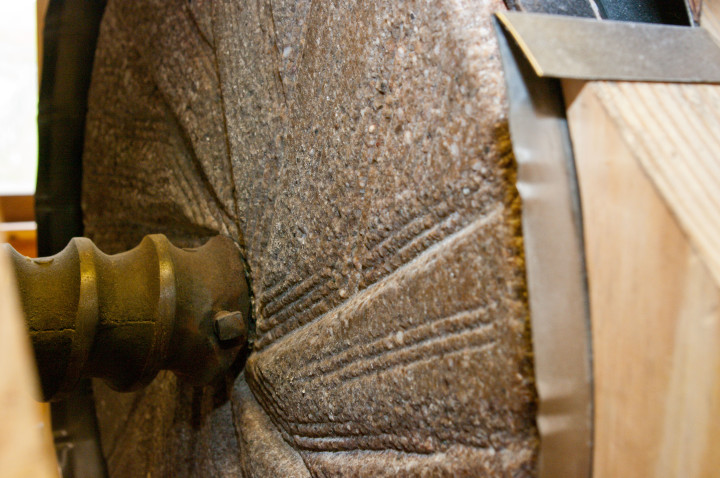It’s a cool, gray morning in Weaverville as we round the bend and pull into Barkley’s Mill on Southern Cross Farm, and its greens, grays and browns, highlighted by the dusting of snow on the mountains, seem to pop out like children’s book illustrations. The long, slow hills that ripple across the farm are where the family grows its Hickory King Dent, an heirloom corn varietal known for its giant white kernels, scarcely smaller than a dime.
“I grew up in the South, and what we grew up eating were this type of grit,” says Jim Barkley of Jim Barkley Toyota, who also happens to be the force behind Barkley’s Mill. To demonstrate, he serves us creamy grits with cheese, bacon, scallions and green peppers.
Established in 2012, the operation does everything on-site, from harvesting to dekerneling to the crush at the 1900s-style water-powered mill. At the top of the property, massive loads of harvested corn are stored in rustic wooden bins, shucked, picked, sorted, dried and piled eight feet high. Because there are visitors, only three employees are at work. But more typically, six could be busy inspecting the cobs, tossing them onto the conveyor and feeding them into the separator, which drops the kernels into one bin, the naked cobs into another.

“When we started the gristmill, our intent was to just grow enough to give away as Christmas presents to friends and families,” Barkley explains. “But we got on the Internet looking for places to buy bags, and when I saw what some of these places were selling grits for, I thought, this may be the key: This may be how we make our farm sustainable, so that our families can be here for four, five or six generations.”
Down the hill, the picturesque water-powered mill wheel churns rhythmically on an otherwise silent hillside. Inside, however, it’s another story: The dual 1919 vintage Williams stone-burr gristmills are anything but quiet.
“We use vertical stones in our mill because the grits don’t get as hot,” says operations manager Micah Stowe. “As long as we can keep it below 120 degrees, it won’t cook the nutrients out during the milling process.”
One stone remains stationary while the one beside it rotates. “This one can move in and out to control the coarseness of your grind,” he explains. The one currently buzzing away beside us is running at about an eighth of an inch. “If you want to make flour, you have them almost touching, or you can run them out and just crack the corn.” The 300-square-foot room can easily crank out 2,000 pounds in a day.
“When you’re milling, you’re getting different extractions through different screen setups,” says David Bauer, the mastermind behind Farm & Sparrow Bakery and All Souls Pizza. He also runs a gristmill just outside of Asheville. “You’re getting corn flour through your first shoot, polenta through the next shoot, and then grits through the next one. So I’ll do a run of corn, and the polenta becomes the polenta crust pizza at the restaurant, the corn flour becomes our cornbread, and then the grits go to Buxton Hall, so they’re all being pulled in different directions.”
Farm & Sparrow is also widely recognized for its commitment to using heirloom grains and corns. Besides growing some itself, the bakery works with growers in Georgia, Tennessee, coastal Carolina and Madison County. Together, they’re helping revive an array of heirloom corns, including Tennessee Red Cob and Bloody Butcher Red Dent Corn. “We do a whole variety of them,” notes Bauer, “and that allows us to blend to people’s taste. So, for instance, Elliott [Moss of Buxton Hall Barbecue] has a specific way he likes his grits milled, and a specific type, and when we first started working with him, we talked and worked our way through all the options.” They’ve done the same with William Dissen of The Market Place and a number of other notable local chefs.

This focus on strains dating back to before the arrival of European settlers isn’t just a passing phase; it’s an activist effort to preserve varietals that would otherwise vanish. According to a recent National Geographic article, 70 percent of crop diversity has been lost since 1900, and between 1903 and 1983 the number of commercially available seed varieties of corn dropped from 307 to just 12. That’s a harrowing thought, should blight strike a few similar strains of seed.
“It’s fun for us to take the approach of doing things like the Bloody Butcher Red Dent Corn here in the mountains, because it was an Appalachian varietal because it’s where it was supposed to grow,” Bauer points out. “And then having to match it on the plate, too. … Otherwise you just get reductionist and say, ‘Well, it’s corn, so it’s good.’ There’s so much flavor there, but none of us know how to do it!
“All the varieties of corn that we’re growing out this year, they’re all Cherokee varieties,” he adds. “Cherokee White Flower, which is used for skillet cakes, and Cherokee White Eagle, which is the original blue corn in this area … they’re all from right here, and they are hard to get information about.”
Conviction and activism aside, restaurateurs often wind up using these varietals purely for their flavors. “I was doing an event about four or five years ago, and Farm & Sparrow was there,” remembers Mike McCarty, executive chef of The Lobster Trap. “They had this grit bread, and he makes amazing bread anyway, but I just kept eating it, and it was blowing my mind how good it was. I asked him where he got the grits from, and he gave me the number of John McEntire, and we’ve never looked back.” McEntire runs Peaceful Valley Farm and gristmill in Old Fort.
“I was using those grits that you get from your Sysco guy,” McCarty explains, “but I had just taken over as executive chef, and I was really trying to think about the direction that I wanted to take the kitchen and restaurant.” Being a seafood restaurant in the mountains “really limited how local I could be,” since so many ingredients had to be shipped in daily from the Carolina coast, New Orleans or New England. “So I started looking at the grits and really wanted to change how we used them, and by happenstance I found these.”
Bauer, who worked in the restaurant industry for years before moving here, says, “It’s night and day. We’d have grits on the menu, and I’d cook grits. And some of those were even coming from farms in the area, but they weren’t that great.
“The interesting thing with corn is that you have these complex root systems. And there’s so much diversity in the open-pollinated, heritage corns that it’s not just a matter of planting a good variety: It’s a matter of planting a variety that interacts with the soil. What will the roots take up from the soil? How will it interact with the weather that year? All these things combine to make corn flavorful or flat. There’s a whole culture around it that is largely forgotten.”




Great Article!
The old grist mill in Bakersville now adjusts their grindstones extra fine to grind polenta for local Italian restaurants.